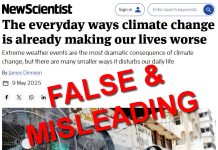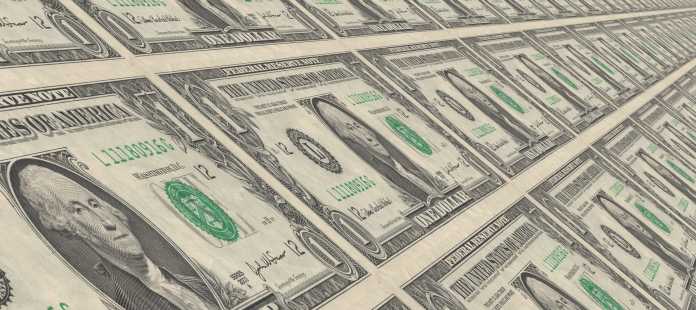The climate activist group Ceres just published ridiculous, biased claims that climate change has hammered the economy, while the establishment media eagerly and shamelessly promotes the bogus claims. Don’t be fooled by the climate activist group; climate change has clearly helped rather than harmed economic activity.
Ceres published its claims in a letter to various federal agencies. The letter opens with the dire warning, “It is more clear than ever that the climate crisis poses a systemic threat to financial markets and the real economy, with significant disruptive consequences on asset valuations and our nation’s economic stability.” Ceres cited no data or evidence for the claims. This is not surprising, because no credible data or evidence supports such false claims.
Despite the lack of supporting evidence, Marketwatch, the New York Times, and many other fake news media outlets reported Ceres’ claims as if they were self-evidently true. Citing Ceres’ letter, Marketwatch asserted, “The U.S. has sustained more than $1.775 trillion in costs from more than 265 climate-related extreme weather events since 1980, by some measures, and more than $500 billion in economic losses between 2015 and 2019.”
Even if extreme weather happened to cause such losses, there is no evidence indicating extreme weather events have been worsened by climate change. Instead, the scientific evidence shows exactly the opposite.
In a recent review of the literature conducted by University of Colorado professor Roger Pielke, Jr., Pielke examined 54 studies published between 1998 and 2020. The studies analyzed the costs of extreme weather events by removing impacts attributable to societal change, such as increasing wealth, increasingly expensive infrastructure built in disaster-prone locations, etc. Pielke found “little evidence to support claims that any part of the global economic losses documented on climate timescales can be attributed to human caused changes in climate, reinforcing conclusions of recent assessments of the Intergovernmental Panel on Climate Change.” (emphasis mine).
That last, italicized part is very important. As Pielke noted, and as repeatedly documented by the website Climate at a Glance, even the United Nations Intergovernmental Panel on Climate Change (IPCC) concludes there is little if any evidence suggesting any recent worsening of floods, droughts, hurricanes, tornadoes, etc. Yet, when a climate activist group like Ceres makes claims to the contrary, the media report Ceres’ false assertions as if they were scientifically indisputable facts.
After making its false claims about past and present climate impacts, Ceres moved on to making equally ridiculous, speculative predictions about future climate harms. To support its claims, Ceres utilized the most extreme, worst-case, and least-likely scenario of the many scenarios examined by the IPCC. That scenario is known as RCP8.5.
RCP8.5 has been heavily criticized in the peer-reviewed literature as being extreme or absurd. RCP8.5 assumes, among other things, an unrealistic 500% increase in coal use and a 6℃ rise in global temperatures by 2100. Even the IPCC admits RCP8.5 is exceedingly unlikely to occur, saying RCP8.5 had only a 10% chance of becoming reality at the time IPCC evaluated it. More recent estimates place RCP8.5’s chance of occurring at less than 3%.
Even if the worst-case estimate of climate change occurs, economist Stan Liebowitz notes that the impact on the economy, as a percentage of estimated GDP, would be miniscule. If RCP8.5 comes to pass, the total cost of damages resulting from climate change in 2090 will be approximately $507.6 billion. Yet, Liebowitz notes, U.S. GDP in 2090, even accounting for climate change, is estimated to be approximately $70 trillion. This means, at worst, the cost of climate change in 2029 will represent only slightly more than 0.7% of U.S. GDP. “Thus the damage from climate change in [the] worst-case scenario, according to our ‘best scientists and experts,’ is less than 1 percent of U.S. GDP in 2090,” Liebowitz observes.
In summary, the climate activist group Ceres published a poorly sourced paper in which it made demonstrably false claims about past climate impacts, demonstrably false claims about present climate impacts, and exaggerated claims about future climate impacts, even in the unlikely event that Ceres’ worst-case forecast climate scenario comes to pass. Then the media trumpeted it like Chicken Little saving us from the sky falling down.
Don’t lie awake at night worrying about climate impacts on the economy. The science and economics say even the worst-case scenario would be quite mild.


















Great coverage . well done
[…] Read the full article here – https://climaterealism.com/2020/07/activist-groups-climate-and-economy-claims-are-bogus-despite-medi… […]